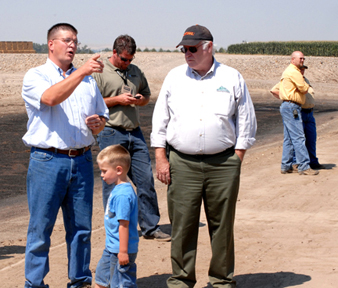Here's a quick dairy farming quiz: What three things do all dairies have a constant supply of? Some easy answers are cows, milk . . . and manure. All day and every day, manure never stops coming. The hard question is, at about 120 pounds per day per moo, what can a dairy do to get rid of all that poo?
For more and more dairies these days the answer is composting. It's an ancient process that uses natural microbes and bacteria to slowly decompose manure and other organic waste into a nice-smelling product that is both highly beneficial and in great demand. In doing so, it dramatically reduces odors, flies, and extremely harmful greenhouse gases like methane and ammonia.
Best of all for dairy farmers, when composting is done correctly, it can shrink a pile of manure by half or more. The result is a material that is lighter and easier to handle, so it's much less expensive to haul to fields. Plus, nearly all of the seeds and pathogens that were in the manure to begin with are destroyed.

Darin Mann (left) explains the composting process to magazine editors at his heifer ranch in Parma, Idaho, on Wednesday.
The catch is, as we learned in Idaho this week at a conference for magazine editors, that good composting is not easy, fast, or cheap. In many ways, composting is just like raising good calves: It takes management commitment, people who know what they're doing, specialized facilities and equipment, tightly structured protocols, and tremendous consistency in following them. The quickest path to composting failure is not doing careful research and planning.
Our visit to M/M Feedlot, a 13,000-head replacement dairy heifer grower in Parma, Idaho, that sells about 20,000 tons of finished compost per year (and has buyers for more!) showed us how to do everything right. It also illustrated the huge regulatory and public perception benefits that can be had by being out in front of environmental issues rather than being dragged along behind them.
Below is the video of Darin Mann talking about M/M Feedlot and its composting operation.

For more and more dairies these days the answer is composting. It's an ancient process that uses natural microbes and bacteria to slowly decompose manure and other organic waste into a nice-smelling product that is both highly beneficial and in great demand. In doing so, it dramatically reduces odors, flies, and extremely harmful greenhouse gases like methane and ammonia.
Best of all for dairy farmers, when composting is done correctly, it can shrink a pile of manure by half or more. The result is a material that is lighter and easier to handle, so it's much less expensive to haul to fields. Plus, nearly all of the seeds and pathogens that were in the manure to begin with are destroyed.

Darin Mann (left) explains the composting process to magazine editors at his heifer ranch in Parma, Idaho, on Wednesday.
The catch is, as we learned in Idaho this week at a conference for magazine editors, that good composting is not easy, fast, or cheap. In many ways, composting is just like raising good calves: It takes management commitment, people who know what they're doing, specialized facilities and equipment, tightly structured protocols, and tremendous consistency in following them. The quickest path to composting failure is not doing careful research and planning.
Our visit to M/M Feedlot, a 13,000-head replacement dairy heifer grower in Parma, Idaho, that sells about 20,000 tons of finished compost per year (and has buyers for more!) showed us how to do everything right. It also illustrated the huge regulatory and public perception benefits that can be had by being out in front of environmental issues rather than being dragged along behind them.
Below is the video of Darin Mann talking about M/M Feedlot and its composting operation.









